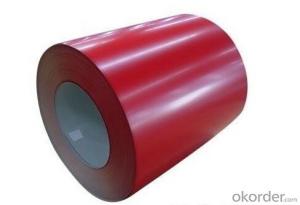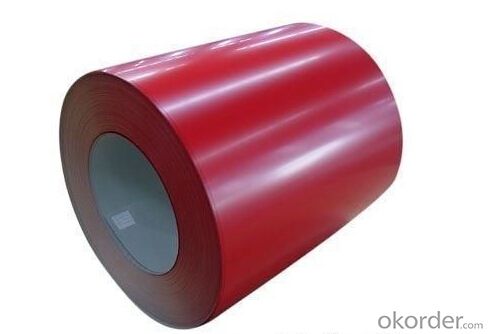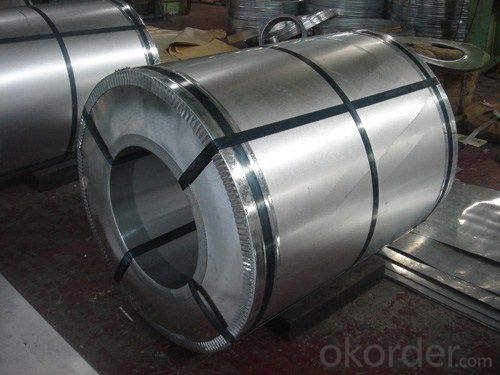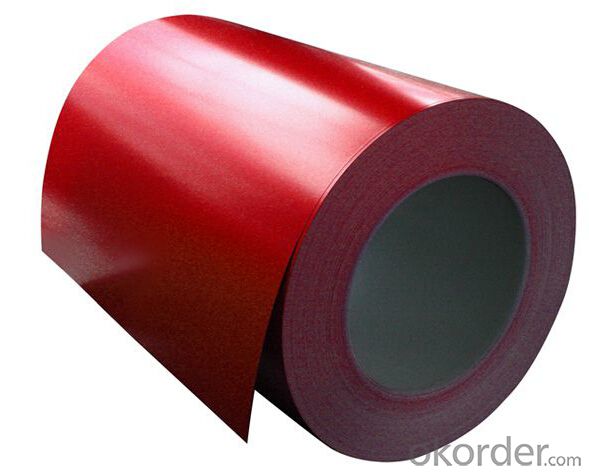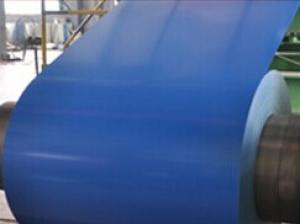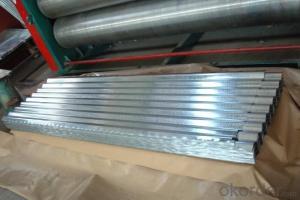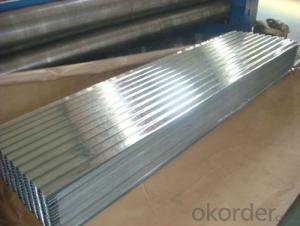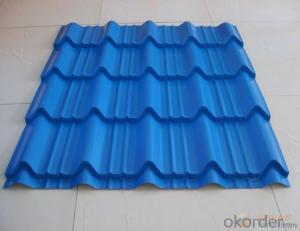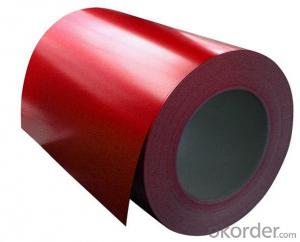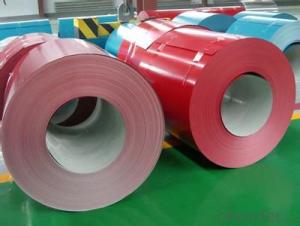Pre-Painted Galvanized/Aluzinc Steel Coil with Good Price
- Loading Port:
- Tianjin
- Payment Terms:
- TT OR LC
- Min Order Qty:
- 50 m.t.
- Supply Capability:
- 10000 m.t./month
OKorder Service Pledge
OKorder Financial Service
You Might Also Like
1. Pre-Painted Galvanized/Aluzinc Steel Coil Description:
With GI as base material, after pretreatment (degrease and chemical treatment ) and liquid dope with several layers of color, then after firing and cooling, finally the plate steel is called pre-painted galvanized (aluzinc) steel. Pre-painted galvanized steel is good capable of decoration, molding, corrosion resistance. It generally displays superior workability, durability and weather resistance.
2.Main Features of the Pre-Painted Galvanized/Aluzinc Steel Coil:
• Excellent process capability
• Smooth and flat surface
• Workability, durability
• Excellent heat resistance performance
• High strength
• Good formability
• Good visual effect
3.Pre-Painted Galvanized/Aluzinc Steel Coil Images
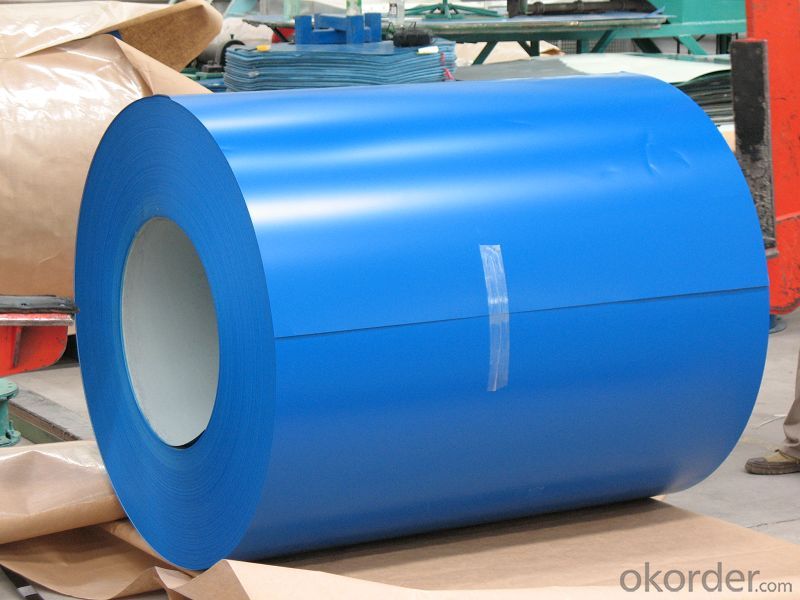
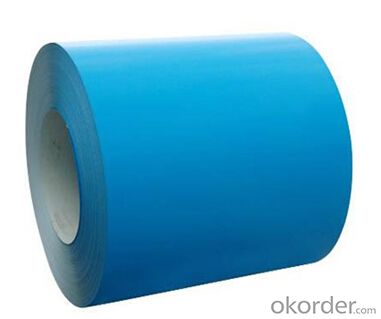
4.Pre-Painted Galvanized/Aluzinc Steel Coil Specification
Standard: AISI, ASTM, BS, DIN, GB, JIS
Grade: DX51D, DX52D
Thickness: 0.17-2.0mm
Brand Name: KMRLON
Model Number: coil
Type: Steel Coil
Technique: Cold Rolled
Surface Treatment: Coated
Application: Boiler Plate
Special Use: High-strength Steel Plate
Width: 20-1250mm
Length: customized
commoidty: pre-painted galvanized steel coil
Thickness: 0.13-4.0mm
width: 20-1250mm
zinc coating: 40-180g/m2
printing thickness: top side: 20+/-5 microns, back side: 5-7 microns
color: all RAL color
surface treatment: color coated
coil weight: 4-7 tons
coil ID: 508/610mm
packaging: standard seaworthy packing
5.FAQ of Pre-Painted Galvanized/Aluzinc Steel Coil
What’s the application of this product?
Roof, roof structure, surface sheet of balcony, frame of window, etc.
What’s the brand of the paint?
We use the best brand of all of the word—AKZO.
- Q: What are the common applications of stainless steel coils?
- Stainless steel coils possess unique properties and characteristics that allow for a wide range of applications. Some of the most frequently seen uses for stainless steel coils include the following: 1. Automotive industry: The automotive industry extensively incorporates stainless steel coils in the manufacturing of components such as exhaust systems, mufflers, and catalytic converters. These applications benefit from stainless steel's corrosion resistance and durability, making it an ideal choice. 2. Construction industry: The construction industry heavily relies on stainless steel coils for structural elements, roofing, cladding, and facades. Stainless steel's high strength, resistance to corrosion, and aesthetic appeal make it a popular choice for architectural projects. 3. Kitchen appliances: Stainless steel coils are commonly utilized in the production of kitchen appliances like refrigerators, stoves, ovens, and dishwashers. Stainless steel's easy cleanability, resistance to heat and stains, and hygienic properties make it the preferred material for these applications. 4. Food processing industry: The food processing industry widely employs stainless steel coils for equipment such as tanks, pipes, and conveyor systems. Stainless steel's corrosion resistance and ease of cleaning ensure the integrity and hygiene of food products. 5. Medical industry: The medical industry extensively utilizes stainless steel coils for various applications, including medical devices, surgical instruments, and implants. Stainless steel's biocompatibility, strength, and resistance to corrosion make it an ideal material for these critical healthcare applications. 6. Energy sector: Stainless steel coils play a crucial role in the energy sector for applications such as heat exchangers, boilers, and pipelines. Stainless steel's high-temperature resistance, excellent mechanical properties, and corrosion resistance make it suitable for these demanding applications. 7. Chemical industry: The chemical industry employs stainless steel coils for storage tanks, piping systems, and reactors. Stainless steel coils are a reliable choice due to their corrosion resistance and ability to withstand high temperatures and aggressive chemicals when handling various chemical substances. 8. Manufacturing industry: Stainless steel coils find extensive use in various manufacturing processes like stamping, forming, and fabrication. The versatility, durability, and ease of machining of stainless steel make it a popular choice for a wide range of industrial applications. In conclusion, the applications of stainless steel coils are vast and varied, thanks to their exceptional properties such as corrosion resistance, strength, durability, and aesthetic appeal.
- Q: im buying a sword and i dont know if i should buy a cold steel sword or a normal sword and that i can some how make that cold steel
- Cold Steel Swords
- Q: How are steel coils used in the manufacturing of construction cranes?
- Steel coils are used in the manufacturing of construction cranes to provide structural strength and durability. These coils are typically shaped and welded to form the main framework of the crane, which supports heavy loads and ensures stability during operation. Additionally, the steel coils are used to fabricate various components such as the boom, jib, and counterweights, which contribute to the crane's lifting capacity and overall functionality.
- Q: How are steel coils processed for stamping or forming?
- Steel coils are processed for stamping or forming through a series of steps. First, the coils are uncoiled and straightened to remove any bends or twists. Then, they are fed into a stamping or forming machine, where the desired shape or pattern is formed by applying pressure. After the stamping or forming process, the excess material is trimmed or cut off, and the finished parts are inspected for quality.
- Q: doesnt steel rust?
- Iron mixed with other metals:
- Q: What are the common surface defects in steel coils?
- Common surface defects in steel coils include scratches, rust, scale, pits, and stains.
- Q: So, I'm doing this project for my chemistry class and I need to explain the raw materials in which paper slips are made of. I'm not really sure if galvanized steel is. If not, can someone PLEASE tell me what raw materials are metal paper clips made of???
- For paperclips, the raw material is steel wire. The company that makes paperclips does not smelt iron, they buy the steel wire at the diameter they want it and they feed it into automated machines that bend the wire and cut it to length. If you want to go back into the whole supply chain, then you are looking at a mine that digs iron ore from the ground. The iron ore (Taconite is one of the minerals but there are others) is sent to a smelter that combines the ore with coke (roasted coal) and oxygen in a huge furnace. They may probably add steel scrap, and continuously cast it into bar. good luck
- Q: I just want to know why is cold steel katana a very good sword?? How can you tell if a cold steel katana is good or not
- Save your money and by a wooden boken. Train with a well balanced wooden one. It is how the great Japanese master started their training. Steel swords are good for display. and perhaps if you become relay good and want to feel the heft and practice cutting straw men and bamboo stalks than invest some money in the real deal for a few hundred $$ at the least.
- Q: How are steel coils used in the manufacturing of electrical enclosures?
- Steel coils are used in the manufacturing of electrical enclosures as they provide the raw material for forming the enclosures' outer shells and structural components. The steel coils are processed and shaped through various techniques such as cutting, bending, and welding, to create the desired size and shape of the enclosure. The steel's strength and durability make it an ideal material choice for ensuring the enclosures can protect electrical equipment from environmental factors and provide safety for users.
- Q: I have a set of steel pans with copper bottoms. When I cook with oil it always burns the oil to the pan and takes days to clean. I don't think I should use steel wool, since it might scratch the surface. Does anyone know a faster way to clean scorched oil off a steel pan?
- they have drywall (mudding) sponges to sand mud when you fix walls in the house, they are grey, square, and do not scratch. They seem to work better than any scrubber ever. Make sure you use a degreaser dishsoap like dawn. Maybe try putting your heat lower in the pan and cooking things more slowly?
Send your message to us
Pre-Painted Galvanized/Aluzinc Steel Coil with Good Price
- Loading Port:
- Tianjin
- Payment Terms:
- TT OR LC
- Min Order Qty:
- 50 m.t.
- Supply Capability:
- 10000 m.t./month
OKorder Service Pledge
OKorder Financial Service
Similar products
Hot products
Hot Searches
Related keywords
